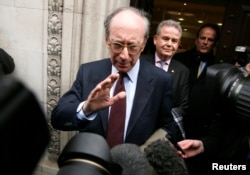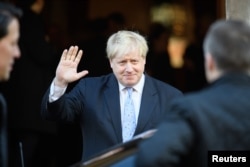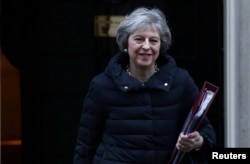By the historic standards of the world's oldest debating society, it was a subdued affair.
The formal motion was, “This House Welcomes the End of American Hegemony.” But it could have been reworded easily, “Will the Inauguration of Donald Trump Mark the End of America's Global Leadership?”
That was the question at the heart of what was debated Thursday on the eve of Trump's swearing in as America's 45th president by students at the Cambridge Union. The motion wasn't carried, but there were no ringing endorsements of the new U.S. president — even by those arguing American global leadership has many years still to run.
'People are very nervous'
“A lot of people are very nervous and worried about Mr. Trump becoming the president of the United States,” said Malcolm Rifkind, one of the debaters and a former foreign minister. “I am one of them and I don't hesitate to say that.”
But he added: “Even a president of the United States such as Donald Trump gives me less worry at night than if the hegemonic power was Russia or China or some other authoritarian state.”
In the chamber of the Cambridge Union and across Britain — a country that prides itself on having a special relationship' with America — there's growing unease about a Trump presidency. The anxiety is shared by the ruling Conservative government, even as it puts faith in Trump's promise made publicly last weekend to engineer rapidly a post-Brexit trade deal for Britain with the U.S.
As it disentangles itself from the European Union, Britain desperately needs to sign new trade deals to help the country recover from its break with the EU.
Trade deal needed
A trade deal with the world's largest economy would boost Britain's economic prospects outside the European single market. Trump's blessing of Brexit and his promise to forge a trade deal quickly is all music to the ears of the British government.
And his questioning recently whether the EU can survive has buoyed anti-EU Brexiters.
“By some accident of history, Britain has begun disentangling itself from Europe at the very moment that the U.S. has elected a president who couldn't care less about the EU. The special relationship, which looked finished, is suddenly alive with possibilities,” crowed the country's Spectator magazine, a conservative publication that was once edited by Britain's current foreign minister, Boris Johnson.
But there are dangers, too, in becoming closely associated with Trump.
Britain has long endeavored to balance relations with America and Europe, and government ministers are fearful of being seen in the Trump camp as negotiations start with the EU over Britain's exit from the bloc. British government officials say they can ill-afford to anger their counterparts in Europe as they negotiate the best exit terms possible; being labeled by European leaders as pro-Trump will backfire on Britain in the forthcoming Brexit talks, they say.
Tough speech
On Tuesday, Prime Minister Theresa May delivered a tough speech outlining how she means to manage a sharp departure for Britain from the European Union, but she made sure to distance herself from the Euro-skepticism of the new U.S. president, who has predicted a populist breakup of the European Union.
“We want the EU to be a success and we want its remaining member states to prosper,” May emphasized in her speech. Her remark was noted by EU leaders with European Council President Donald Tusk tweeting the next day: “We took note of PM May's warm, balanced words on European integration. Much closer to narrative of Churchill than President-elect Trump.”
Brexit negotiations, and Trump's skepticism of the European Union, aside, British ministers share their European counterparts’ worry about what a Trump presidency might mean for NATO, an organization he has dubbed “obsolete.” And they fear an unraveling of the West's long-standing collective defense arrangements, especially in light of Trump's apparent placing of German Chancellor Angela Merkel and Russian President Vladimir Putin on an equal footing.
“I start off trusting both,” Trump said recently. “But let's see how long that lasts. It may not last long at all.”
Removing sanctions?
Like their European counterparts, British officials are anxious when Trump says he wants to “make some good deals with Russia,” or remove sanctions imposed on Russia for its annexation of Crimea in return for a reduction in nuclear weapons. Removing sanctions would provide in effect, they say, U.S. blessing of Russian aggression towards Ukraine and risk Russian provocation in the Baltic states.
Nicholas Soames, a British Conservative lawmaker and grandson of Britain's wartime leader Winston Churchill, tweeted this week, “Trump needs to show he is not naive and understands that Putin's aim is to destroy the transatlantic alliance and weaken the EU.”
Speaking at the Cambridge Union, Alan Mendoza, director of the Henry Jackson Society, a London-based think tank, lamented that Trump “doesn't speak the language of the liberal order of the last 60 years.” He held out hope out that what Trump says now isn't necessarily what his administration will do. But added darkly: “We have not encountered an international order that is unstable since the 1930s and that didn't end so well, if you recall.”












